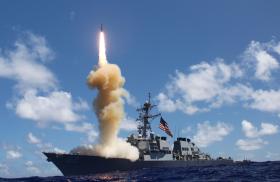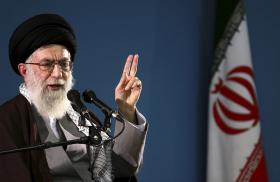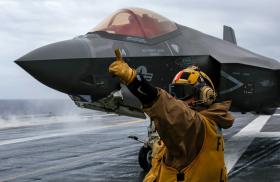
- Policy Analysis
- PolicyWatch 4039
Trump Meets Sharaa: Writing a New Chapter in U.S.-Syria Relations

The two leaders raised a wide array of crucial proposals, giving Secretary Rubio and the rest of the Trump team unprecedented room to set the terms for a mutually beneficial post-sanctions relationship.
During remarks in Saudi Arabia yesterday, President Trump made the monumental announcement that the United States will be lifting all of its sanctions on Syria—a huge policy shift that was reaffirmed when he met with President Ahmed al-Sharaa earlier today. The decision will be further cemented in a forthcoming meeting in Turkey between Secretary of State Marco Rubio and Syrian Foreign Minister Assad al-Shaibani. Previously, the administration had been slow-moving and tepid in engaging the authorities who ousted the Assad regime late last year; now, President Trump wants to give the new Syria “a chance at greatness.” Yet this important step forward should be seen as just the beginning, not the end. Follow-up engagement is a must—not just for U.S. interests, but also for the benefit of Syrians looking to achieve the demands they first took to the streets for in 2011.
What They Discussed, and What They Left Out
According to the U.S. readout of the meeting, Trump urged Sharaa to take several bold steps: join the Abraham Accords with Israel, tell foreign fighters to leave Syria, deport Palestinian terrorists, help the United States prevent an Islamic State (IS) resurgence, and assume responsibility for IS detention centers in the northeast. In turn, Sharaa noted that Iran’s departure from Syria represents a significant opportunity, and that Washington and Damascus share an interest in countering terrorism and eliminating chemical weapons. He also affirmed his commitment to Syria’s 1974 disengagement agreement with Israel. He concluded by inviting American companies to invest in Syrian oil and gas, expressing hope that his country could facilitate wider trade between east and west.
The landmark meeting will change how the United States works with Syria’s new government, providing opportunities to directly shape the country’s future in a mutually beneficial way. When Rubio continues the discussion with Shaibani, he will need to clarify a few key points and raise some that Trump and Sharaa did not address:
Israel-Syria track. To accelerate this track, Washington should either facilitate a new set of discussions between Jerusalem and Damascus or bolster the existing mediation process led by the United Arab Emirates. Israel has legitimate security concerns about post-Assad Syria, though the way it handled them in the past five months has not always been conducive to building relations with the new government. New talks could help outline conditions or offer security assurances related to Israel’s eventual withdrawal from territory it has taken over since December. This in turn could set the stage for a nonaggression pact and discussions about Syria eventually joining the Abraham Accords.
Washington should also urge Damascus to formally acknowledge that the Shebaa Farms area is Syrian territory, not Lebanese. Bashar al-Assad affirmed this point during negotiations in the mid-2000s, and the new government should make it official policy as part of border demarcation talks with Beirut. This issue has once again become urgent amid the new Lebanese government’s efforts to undermine Hezbollah and its transnational smuggling networks.
Foreign fighters. Washington needs to provide more specific guidance on what “telling foreign terrorists to leave” means in practice. This task is much easier said than done, so a little U.S. patience could go a long way. Currently, three main buckets of foreign fighters remain in Syria: those affiliated with IS, Hayat Tahrir al-Sham (HTS, the group Sharaa led before becoming president), and the Kurdistan Workers Party (PKK). Most European and Arab countries have been reluctant to repatriate their nationals from Syria, let alone ones that joined HTS. Yet making such individuals stateless could create serious counterterrorism challenges in the future, as happened with foreign fighters following the anti-Soviet jihad in Afghanistan in the 1980s and Pakistan’s expulsion of foreign fighters in 1992. Having thousands of foreign fighters head for locales like Afghanistan, Yemen, Somalia, or Mali could similarly undermine international security today. Therefore, Washington should think seriously about Sharaa’s call for naturalizing foreign fighters specifically from HTS and setting up something akin to a French Foreign Legion for Syria, so that Damascus could better control their activities.
Deporting Palestinian terrorists. The question is where would they be sent, and under what terms? Neither Israel nor the Palestinian Authority wants to repatriate adversarial members of Hamas, Palestinian Islamic Jihad (PIJ), the Popular Front for the Liberation of Palestine (PFLP), or other terrorist groups unless there is some arrangement to arrest them immediately upon their return. In fact, Israel would likely prefer that such individuals remain far from its borders. This issue should be discussed as part of broader Israel-Syria negotiations. The approach seen in the past month—with Syrian authorities arresting multiple PIJ and PFLP members—provides a temporary solution until Damascus, Ramallah, and Jerusalem can reach a fuller understanding on this issue.
Fighting IS and overseeing detention facilities. U.S. and Syrian officials have already been working together on the counter-IS fight since Assad’s fall, focusing on areas outside the northeastern zone controlled by the Kurdish-led Syrian Democratic Forces (SDF). Going forward, they need to discuss how best to integrate the SDF and its autonomous civil administration into the new government. This means working with Damascus to assuage Kurdish concerns about their place in the new Syria. Washington should also remind Sharaa’s camp to avoid monopolizing power, instead allowing local communities to have a role in their own governance and security within the framework of a unified Syrian state.
In addition, U.S. officials need to articulate a timeline for Damascus to take over detention facilities holding IS members and their families. Funding and training issues should be addressed in these discussions, in coordination with European partners in the Global Coalition to Defeat IS.
Reopen the Syrian embassy in Washington and assign a charge d’affaires in Damascus. The Trump administration should begin the process for reopening the Syrian embassy and, in the meantime, encourage officials in Damascus to name a “protective power” to represent them in Washington. Reopening the U.S. embassy in Damascus will take more time due to practical and security concerns—all the more reason to get going on the process of updating old embassy plans (first drafted more than fifteen years ago) and setting other preparations in motion. Washington could also coordinate with allies who have already reopened their embassies or are in the process of doing so. Until a facility is ready, administration officials could plan more trips to Damascus and consolidate the U.S. government’s cross-departmental Syria Regional Platform in Beirut, thereby facilitating engagement and mutual understanding on a host of issues. Prior to President Trump’s sanctions announcement, recent field research in Syria indicated that new officials in Damascus lacked understanding about the U.S. policy process, creating a significant barrier to deeper engagement.
Governance. Washington should advise Damascus that ruling via a small, senior-level cohort is unsustainable, and micromanaging decisions rather than delegating and trusting others is a recipe for reproducing some of the inequities seen under the Assad regime. Further, interfacing only with traditional notables (e.g., community elites, religious scholars, business leaders, tribal sheikhs) could result in deeply gender-biased policymaking, in contrast to engaging traditional civil society groups that tend to have much more gender parity.
Transitional justice. Thus far, Syria’s new leaders have paid only lip service to holding a transitional justice or truth and reconciliation process, so Washington should press them to take this issue seriously. Without urgent action on this front, continued vigilante violence, individuals wanting to take “justice” into their own hands, and the potential for more massacres will likely emerge due to the legacy of the Assad regime’s horrible crimes.
Minorities. Since Assad’s ouster, President Trump’s base has been particularly concerned about the dangers that minorities might face in a Syria ruled by former jihadists. For instance, a massacre against Alawites unfolded in early March, and Druze communities have faced attacks as well. Washington should therefore be prepared to discuss potential preventive measures in future talks.
Business relations and great power competition. Since December, China has been the top country in applying for open tender contracts related to various industries in Syria. If Sharaa is sincere in wanting investment and help from the American business community, Washington should make clear that U.S. interests should take precedence over Chinese relations. Otherwise, ties with the United States will necessarily be limited.
Conclusion
President Trump’s announcement has opened a new chapter in the U.S.-Syria relationship, which has been rocky at best for decades when not completely broken. Now that sanctions will no longer hinder bilateral progress, Washington can take advantage of many opportunities that could benefit U.S. interests and help set Syria and its diverse communities on the right path. Yet much work will need to be accomplished in Washington and Damascus first.
Aaron Zelin is the Gloria and Ken Levy Senior Fellow at The Washington Institute and author of The Age of Political Jihadism: A Study of Hayat Tahrir al-Sham.



